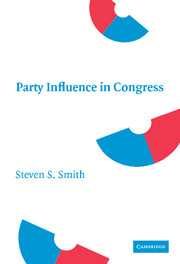Book contents
- Frontmatter
- Contents
- Acknowledgments
- 1 Introduction
- 2 The Microfoundations of Theories of Congressional Parties
- 3 The Types and Sources of Party Influence
- 4 The Search for Direct Party Effects
- 5 Recent Theories of Party Influence: Cartel and Conditional Party Government Theory
- 6 Revisiting Pivotal and Party Politics
- 7 Reexamining the Direct and Indirect Influence of Party in the House and Senate
- 8 More Than a Conclusion
- Appendix
- References
- Index
2 - The Microfoundations of Theories of Congressional Parties
Published online by Cambridge University Press: 05 June 2012
- Frontmatter
- Contents
- Acknowledgments
- 1 Introduction
- 2 The Microfoundations of Theories of Congressional Parties
- 3 The Types and Sources of Party Influence
- 4 The Search for Direct Party Effects
- 5 Recent Theories of Party Influence: Cartel and Conditional Party Government Theory
- 6 Revisiting Pivotal and Party Politics
- 7 Reexamining the Direct and Indirect Influence of Party in the House and Senate
- 8 More Than a Conclusion
- Appendix
- References
- Index
Summary
In the fall of 2005, House Majority Leader Tom DeLay (R-TX) was indicted by a Texas grand jury for violations of the Texas campaign finance law. As required by a House Republican Conference rule, Rep. DeLay temporarily gave up his leadership post. The rule, which Republicans had considered dropping at the beginning of the year but were compelled to reinstate to avoid further criticism, spared the party of having to vote to dethrone a leader who might prove to be embarrassing. Speaker Dennis Hastert (R-IL) appeared to have Rules Committee Chairman David Dreier (R-CA) in line to replace DeLay, but Republicans belonging to the Republican Study Committee, an unofficial group of about 100 conservatives, demanded that Roy Blunt (R-MO) take over because Blunt was a more faithful conservative than Dreier on social issues.
Blunt's appointment was temporary, but DeLay's problems led DeLay to resign from his leadership post in January 2006, leading to a contest to replace him. The contest, which generated a challenge to Blunt from John Boehner (R-OH) and John Shadegg (R-AZ), was affected by at least two important considerations. A scandal involving a lobbyist with connections to DeLay and former DeLay staff members that implicated several House Republicans led party members to worry about the electoral fallout and produced demands that lobbying reforms be enacted. Neither Blunt nor Boehner was directly involved in the scandal, but their connections with lobbyists were questioned.
- Type
- Chapter
- Information
- Party Influence in Congress , pp. 9 - 43Publisher: Cambridge University PressPrint publication year: 2007



